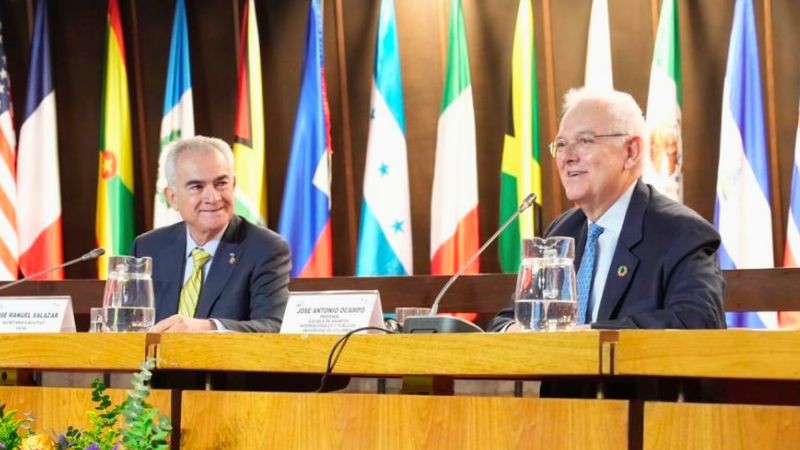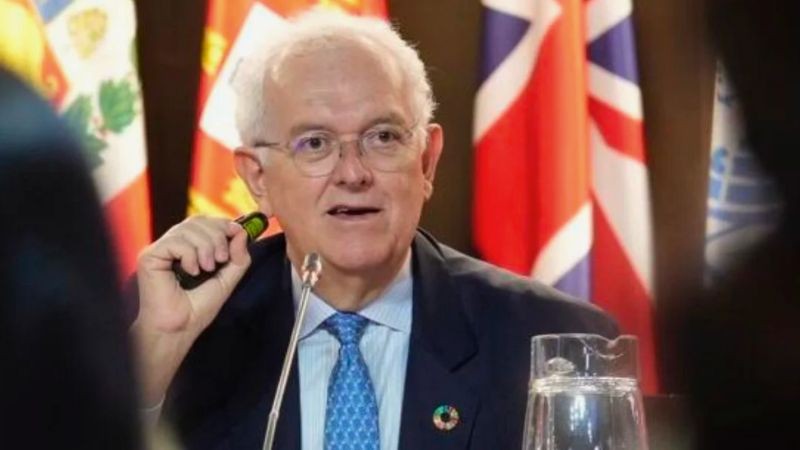Columbia Prof. José Antonio Ocampo suggests "profound reforms" to the international financial system
Ocampo called for reforms of global, regional and subregional support networks to generate greater impact in developing countries.

Columbia School of International and Public Affairs (SIPA) Professor and former Executive Secretary of the Economic Commission for Latin America and the Caribbean (ECLAC), José Antonio Ocampo, called for profound reforms to the international financial system, based on a new architecture grounded in networks of global, regional, and subregional institutions during a keynote address at the main headquarters of ECLAC in Santiago.
The former Minister of Finance and Public Credit of Colombia delivered a lecture titled “Reforms to the International Financial System,” the second in a series of Keynote Lectures organized to commemorate the 75th anniversary of ECLAC.
Following the welcoming remarks of the organization's Executive Secretary, José Manuel Salazar-Xirinachs, Ocampo focused his presentation on four fundamental themes for the reform of the international financial system: multilateral development banking, the international monetary system, sovereign debt restructuring, and critical institutional issues.
Regarding multilateral development banking, he highlighted the advantages of a dense system where, alongside global institutions, there are more regional and even subregional institutions: “This system is well developed in the context of multilateral development banks, but not in the international monetary system,” he warned.
He emphasized that the World Bank has been crucial in critical junctures, such as the 2007-2010 crisis, but traditional regional banks have grown more dynamically, like the Inter-American Development Bank (IDB) and CAF - Development Bank of Latin America, which have been the main sources of financing for Latin America and the Caribbean: “Development banking must continue to expand, offering both structural and countercyclical solutions. It is essential to continue financing the public sector and expanding support for the provision of international public goods,” he stated.

Regarding the international monetary system, the Ocampo stressed that, due to the international financial volatility, one of the clearest effects is that developing countries have had to accumulate many more international reserves than before. Hence, the demand for reserves has significantly grown over time, he emphasized.
He also specified that among the possible reforms to the global reserve system is working on a more active system of multiple currencies and giving a more dynamic role to Special Drawing Rights (SDRs).
With regard to sovereign debt restructuring, he pointed out that existing debt renegotiation mechanisms do not provide adequate and timely relief and do not treat debtors and creditors with uniform rules. He also warned that the growing problems of public debt were exacerbated by the COVID-19 pandemic and remain very severe. Therefore, he highlighted the need for a new voluntary ad hoc mechanism, taking into account differences between countries and potentially supported by multilateral development banks.
Ocampo also underlined the importance of implementing three basic tasks: Continuing reforms of the Bretton Woods institutions, expanding the voice and participation of developing countries in decision-making processes; in economic matters, evolving towards a more representative organization at the apex of the international economic cooperation system; and building a denser, multilevel architecture, particularly strong regional institutions.
During his presentation, Ocampo also acknowledged the international relevance of ECLAC, “which is not only the main research center of the United Nations but also the main research center on issues related to Latin America and the Caribbean,” he stated.